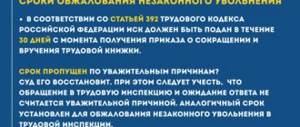The labor legislation of the Russian Federation considers various types of disputes that often arise between an employee of an enterprise and an employer, which cannot be resolved in a working manner, and concerning the application of labor legislation, collective agreements, and other documents on labor relations, as individual labor disputes.
Legislation requires recognition of labor conflicts that occur between an employer and a former employee of an enterprise who previously had an industrial relationship with a specific employer or another entity who wanted to sign an employment contract with him.
The Labor Code of the Russian Federation and many Russian laws clearly define a procedure that is most conducive to the resolution of individual labor disputes (ITS). The courts also deal with these types of issues. These authorities are guided by procedural regulations that are in force on the territory of Russia.
Subject of labor disputes
The subject that became the basis of the conflict is various issues, mainly related to:
- payment for work performed;
- conflicts regarding the imposition of disciplinary sanctions by the employer;
- receiving benefits and compensation;
- provision of paid and unpaid leave;
- changes in working conditions;
- application of labor legislation and other NAPs;
- recovery of damage caused to the employer, etc.
Labor conflicts also include service conflicts, the occurrence of which is possible while performing public service.
One of the participants in the ITS under Article 20 of the Labor Code of the Russian Federation is an employer, organization (legal entity) or other entity that has the right to enter into contracts with new employees.
The other party is the employee, an individual who is in an employment relationship with the employer.
The exception is citizens who previously had an employment relationship with a given employer, and citizens who had the desire to conclude such an agreement, but were denied such a right by the employer.
Mandatory conditions for making a decision
One of the mandatory circumstances that influences the judge’s decision is the pre-trial settlement of a labor dispute. Attempts to reach an agreement without trial must be mentioned in the claim with evidence attached. The final decision is influenced by a number of conditions.
The impossibility of reinstating the plaintiff in his position due to the bankruptcy of the company. In this case, he is awarded monetary compensation commensurate with his earnings during the forced absence. The court must approve the need to change the entry in the work book - not at will, but due to the liquidation of the company.- Unlawful dismissal before the expiration of a fixed-term contract. In this case, the entry in the employment record is canceled (an additional addition is made), and the employee is reinstated in his position.
- The end of the fixed-term contract by the time the decision regarding illegal dismissal is made. In this case, the court obliges to change the wording in the work book - “in connection with the end of the contract” and to pay compensation for early dismissal, as for forced absence.
- Lawful dismissal of the plaintiff with incorrect wording. In this case, the employee will not be required to be reinstated, but only to change the entry in the employment record.
- Impossibility of further employment due to an incorrect entry in the work book. The court obliges the employer to pay compensation for the entire non-working period and moral damage. This provision only applies if the influence of the entry on the fact of employment is proven.
Moral damage is determined by the totality of moral, physical and psychological suffering and other circumstances that the court considers important.
Who resolves labor disputes
In accordance with the requirements of Article 382 of the Labor Code of the Russian Federation, disputes arising between an employee and an employer are considered by specially created commissions at enterprises (CTS). The judiciary also has the right to resolve disputes of this nature.
When a resolution to a conflict issue cannot be made in a way that satisfies both parties to the conflict, the matter often ends up in court. The application may be submitted by one of the participants in the unresolved situation.
This opportunity is also provided to trade unions. This authority may initiate proceedings on the dispute through the court:
- if the trade union does not agree with the decisions made by the CCC;
- if an employee submits an application to the court, without using the opportunity to appeal to the CCC;
- when submitting an application to the court by a prosecutor who does not agree with the verdict of the CCC, which contradicts the requirements of labor legislation and other legal acts.
Individual vehicles
Such a dispute is a disagreement that arose between an enterprise and an employee who was in an employment relationship with it, is currently employed, or who wanted to enter into an employment contract and was refused.
Depending on the nature of the dispute, it may be considered in the following authorities that have permission to do so:
- commission for vehicle approval, organized directly at the enterprise (in accordance with Articles 382, 384-390 of the Labor Code of the Russian Federation);
- courts of general practice (district or city), in accordance with Articles 391-397 of the Labor Code of the Russian Federation;
- higher authorities (for certain categories of workers, for example military personnel or employees of government organizations);
- bodies of the state labor inspection (according to articles 354-365 of the Labor Code of the Russian Federation).
Non-claimable
Individual labor disputes concerning disagreements over working conditions, their changes or the introduction of new conditions are non-litigious in nature and are resolved through negotiations within the enterprise.
If through negotiations the parties have not reached a common opinion, then to resolve the situation you can contact the state labor inspectorate.
Claims
Individual disputes arising on issues of interpretation and application of labor legislation and regulations, violation of the terms of an employment contract, are actionable in nature and are considered in two instances: the labor dispute commission or the court.
Labor Dispute Commissions
These bodies are primary ones, the main function of which is to accept ITS for consideration at enterprises and in various teams. The initiators of the organization are the employees of the enterprises themselves or their representative body and the employer KTS (Article 384 of the Labor Code of the Russian Federation). Such commissions include a proportional number of representatives from both sides.
When the employer and employee representative body receive a written request to create this body, they are required to select and send their own representatives to the CCC within 10 days. Their appointment is the responsibility of the head of the enterprise or individual entrepreneur.
The party representing the interests of the members of the collective are the delegates nominated by its general meeting or elected by the representative body with their further approval at the general meeting of the collective. Such bodies can be created directly in any division of the enterprise on the same basis as the CTS of the enterprise. The commissions formed in individual divisions are in charge of reviewing ITS that have arisen in this division.
The CCC seals its decisions. The organization and technical support of the work of this body is carried out by the employer, and a chairman is selected from among its members. An alternate must also be selected. The secretary is responsible for maintaining minutes and preparing documentation.
Collective vehicles
The concept of collective vehicles is specified in Article 389 of the Labor Code of the Russian Federation.
According to the text of the document, employees who have entered into a collective labor agreement have the right to protection if the following disagreements arise:
- changing and establishing working conditions;
- changing and establishing the amount or procedure for paying wages;
- when concluding, amending and fulfilling the conditions of collective TD;
- if the employer refuses to take into account the opinion of the team representative in order to adopt any internal regulations of the enterprise containing the norms of labor legislation.
In order to start a collective labor dispute, employees of an enterprise must approve their demands to management at a general meeting and send them in writing to the employer.
At least half of the entire staff and two-thirds of the delegates elected as representatives must be present at the meeting.
The employer cannot interfere with the holding of a meeting and is obliged to provide appropriate premises for this.
During the meeting, minutes must be kept, the date of creation of which is the moment the labor dispute begins.
A copy of the requirements can be simultaneously sent to the commission for resolving collective labor disputes (according to Article 407 of the Labor Code of the Russian Federation).
In this case, the CTS body conducts an inspection to ensure that management has received written requirements.
To consider the received requirements, the employer is given a period of three working days, after which he is obliged to inform the body representing the interests of the collective about his decision in writing.
If the demands of the collective are received by the manager on behalf of the trade unions, then the employer must inform the decision on them within a month from the date they were accepted for consideration.
If a decision to satisfy the collective’s demands was not made within the specified time, or the employer does not consider their implementation possible, then the resolution of the labor dispute moves to the next stage, which is called conciliation procedures.
Conciliation procedures consist of the following stages:
- consideration of the CCC by the conciliation commission, on the basis of Article 402 of the Labor Code of the Russian Federation;
- consideration of the CCC by the parties with the participation of a mediator, on the basis of Article 403 of the Labor Code of the Russian Federation;
- resolution of the labor arbitration body in accordance with Article 404 of the Labor Code of the Russian Federation.
Resolving disagreements through consideration by a conciliation commission is a mandatory step.
Only after the dispute has been considered by the reconciliation commission (and if the parties have not reached an agreement), can one proceed to the procedure for resolving the conflict through arbitration.
All parties to a labor conflict are required to participate in conciliation procedures; evasion of participation is not allowed.
The decision made during conciliation procedures is made in writing and is binding on each of the parties involved in the labor dispute.
The execution of the adopted agreement is controlled by representatives of both disputing parties (based on Article 408 of the Labor Code of the Russian Federation).
Participants' guarantees
According to Article 405 of the Labor Code of the Russian Federation, members of the conciliation commission, as well as labor arbitrators participating in the procedure for resolving the dispute, are released from work duties related to the performance of their main work for the duration of the conflict resolution.
At the same time, their wages remain in the amount of average monthly earnings. The salary retention period is stipulated for three months within one calendar year.
According to the same article of the Labor Code, representatives of the work collective during the entire period of the TC permit cannot be subjected to the following actions on the part of the employer:
- disciplinary sanctions;
- transfer to another job;
- dismissal at the initiative of management.
Competence of CTS
In accordance with Article 385 of the Labor Code of the Russian Federation, the CCC is called upon to search for solutions to disputes regarding violations of legislative standards on labor and other legal acts. The commission meets if a complaint is received from an employee of an enterprise, and if it is impossible to resolve the disputes on its own or with the involvement of a representative through negotiations between the parties to the conflict.
The employee has three months during which he can write a complaint to this commission. The term is calculated from the date by which he became aware or could have learned that his rights were violated in some way. Upon receipt of such an application, the CTS must register this application from an employee of the organization and consider it within a ten-day calendar period, calculated from the date on which the application was submitted.
Disputes between an employee and an employer are resolved with the direct participation of the employee who submitted his application. If he is unable to personally attend a meeting of the commission, his rights may be represented by a representative authorized by him. If neither the representative nor the applicant can take part in the work of this body when considering the application submitted by him, he may allow the commission to consider the controversial issue without his participation. To do this, you need to write a corresponding application and register it with the CCC.
If the applicant or his representative does not appear at the meeting where his dispute was to be considered, the meeting must be postponed. If an employee or his representative fails to appear again without compelling reasons, the CCC has the right to remove the issue from the agenda. But this fact does not deprive the employee of the opportunity and right to re-file the same dispute with the commission in accordance with the time limits provided for by the Labor Code of the Russian Federation - within three months.
The CCC has broad rights that allow it to carry out its activities within its competence, namely:
- invite specialists on issues relevant to the nature of the dispute;
- call witnesses to clarify the nuances of the dispute;
- demand from the employer or his representatives to present, within the time limits established by the commission, documents relating to a specific individual dispute.
A meeting of this body is competent if more than 50% of the members defending the rights of the employee and more than 50% of the members from the employer are present. During the work of the commission, a protocol is kept, signed by the chairman (deputy chairman). A document is considered valid if it is certified by the seal of the CTS.
Voting on these types of disputes is carried out secretly by a simple majority of votes of the present members of the CCC (Article 388 of the Labor Code of the Russian Federation).
Who resolves disputes between employee and employer
The formation of a labor arbitration tribunal (its composition, regulations and powers) is formalized by a decision of the employer, employee representatives and the authorized government body. In this case, the dispute must be considered within 5 working days from the date of establishment of the labor arbitration tribunal.
It must be taken into account that in some cases, exclusively the judicial procedure for resolving individual labor disputes is applied. This means that the commission is not approached to resolve such a dispute.
If an individual labor dispute has not been considered by the labor dispute commission within 10 days, the employee has the right to transfer the dispute to court. An employee can go to court even after the dispute has been considered by the labor dispute commission, if he wants to appeal its decision.
Article 392. Time limits for applying to court for resolution of an individual labor dispute
By decision of the general meeting of employees, labor dispute commissions can be formed in the structural divisions of the organization. These commissions are formed and operate on the same basis as the commissions on labor disputes of the organization.
The labor dispute commission makes a decision by secret vote by a simple majority of the commission members present at the meeting.
How long and in what order a particular dispute will be considered depends on the body to which the applicant applied and the circumstances of the case.
It is not always clear where to turn if labor disputes arise. The Labor Code of the Russian Federation gives a clear answer to this question. Collective disputes are considered by a conciliation commission, and if the conflict cannot be resolved at the first stage, the parties turn to an independent mediator or labor arbitration.
The employee has 3 months from the date of the incident to file an application. If the employee contacts the CCC, it must study the material within 10 days and make a decision. If an employee disagrees with the commission’s verdict, he has the right to go to court. He is also given 3 months from the date of violation of rights to file a claim.
The court considers the case and then makes a decision.
Article 381. The concept of an individual labor dispute
The employee has three months during which he can write a complaint to this commission. The term is calculated from the date by which he became aware or could have learned that his rights were violated in some way.
Conflicts between superiors and subordinates arise quite often. The reasons for this can be very different. Disagreements can be resolved by referring to the terms of the contract. However, the situation cannot always be resolved at the workplace, so in some cases disputes arising between an employee and an employer are resolved in court.
If you don’t know your rights, you won’t understand that they were violated, you won’t fulfill your obligations, and now you’ve already violated someone’s rights.
The subjective side of a labor dispute characterizes its internal aspect. It covers the motives and goals of the parties, their attitude to events and actions (inactions) that led to the impossibility of the normal functioning of labor relations.
Copies of the decision of the labor dispute commission, signed by the chairman of the commission or his deputy and certified by the seal of the commission, are handed over to the employee and employer or their representatives within three days from the date of the decision.
The primary source is the “Civil Procedure Code of the Russian Federation.” Article 56. Obligation of proof. Here is the original text: “Each party must prove the circumstances to which it refers as the basis for its claims and objections.”
First, you will be told about the basic rules that you need to follow in order to maintain life and health in a variety of situations.
During the probationary period, you evaluate not only the employee’s work skills and abilities, but also how he observes work discipline or interacts with colleagues.
A labor dispute has a substantive legal nature; a special subjective right, which is guaranteed by law to its parties, has a procedural nature. The procedural nature of the right to labor disputes can be explained by the fact that it is aimed at ensuring the protection of the subjective rights and legitimate interests of the parties to labor relations, which cannot be due to a dispute.
If the dispute was considered by a commission consisting of less than half of its members, then the decision made is not enforceable and the resolution of the conflict is transferred to the court. The case is also transferred to the court in case of delays in consideration, since according to Art. 387 of the Labor Code of the Russian Federation, the review process must take place within ten days from the date of filing the application.
Despite the fact that employers are not interested in inspections by supervisory authorities and legal disputes, in most cases the employee fails to defend his interests.
A prerequisite for resolving a conflict is to conduct conciliation procedures that are designed to resolve the situation in the most beneficial manner for each of the parties.
Few people know how to put forward their demands and achieve their fulfillment, or how to behave in a stressful situation of dismissal or non-payment of wages.
Any employer organization, in the process of maintaining labor relations with its employees, faces the risk of labor disputes. Such labor disputes can be either individual or collective.
The lion's share of civil cases regarding labor conflicts is opened on the basis of claims filed by employees: for illegal dismissal, discrimination in hiring, non-payment of wages or compensation required by law. The opposite situation, when the employer appears as a plaintiff, is extremely rare.
Based on the certificate issued by the labor dispute commission and presented no later than three months from the date of its receipt, the bailiff enforces the decision of the labor dispute commission.
The parties to a collective labor dispute usually appoint representatives. The interests of the workers can be represented by the head of the trade union cell or a member of the workers' activist group, and the employer - by the director or lawyer of the enterprise.
Legislation requires recognition of labor conflicts that occur between an employer and a former employee of an enterprise who previously had an industrial relationship with a specific employer or another entity who wanted to sign an employment contract with him.
The exception is citizens who previously had an employment relationship with a given employer, and citizens who had the desire to conclude such an agreement, but were denied such a right by the employer.
Who considers individual labor disputes? The general procedure for considering individual labor disputes under the Labor Code of the Russian Federation provides for 2 instances.
On the last working day, pay the employee off and give him a work book. It is important for the employer to fulfill all the conditions for dismissal and draw up the documents correctly.
The employee is considered subject to punishment within one year from the date of the reprimand or reprimand.
Dismissal is the most serious of disciplinary penalties. Several comments and reprimands over the past 12 months are grounds for dismissing an employee for repeated violations of labor discipline. It is important to take into account the fact that by the time of dismissal the first disciplinary sanction should not be lifted early or repaid after a year.
In addition, workers are usually poorly aware of their labor rights and do not know what actions to take if their interests are violated.
Labor disputes that arise between a worker and a manager are resolved by the CTS. According to the law, there is a procedure for creating labor commissions. It consists of an equal number of participants on both sides. Representatives from employees are elected by a meeting of workers, and from management, they are determined by the administration of the enterprise.
Collective labor disputes are considered by a conciliation commission with the participation of a mediator or in labor arbitration (Article 61 of the Labor Code of the Russian Federation).
The first stage is the creation of a special commission, which should try to convey to each of the parties the most advantageous provisions from the point of view of not only the work environment, but also legislation. The next steps are the involvement of an intermediary who acts in a similar way, as well as the creation of labor arbitration.
The Labor Dispute Commission elects a chairman, deputy chairman and secretary of the commission from among its members.
The causes of labor disputes are negative factors that cause disagreements in connection with the application of labor legislation and other acts containing labor law norms, the terms of labor contracts, the establishment of new or changes in existing working conditions. Based on Article 384 of the Labor Code of the Russian Federation, labor dispute commissions can be created both at the initiative of workers (or their representative body) and at the initiative of the employer.
In practice, there are many more reasons for conflicts between employees and employers.
In accordance with Art. 60 of the Labor Code of the Russian Federation, individual disputes are considered by labor commissions, inspections or during a court hearing.
An individual labor dispute is a dispute between an employer and a person who previously had an employment relationship with this employer, as well as a person who has expressed a desire to conclude an employment contract with the employer, if the employer refuses to conclude such an agreement.
When the employer and employee representative body receive a written request to create this body, they are required to select and send their own representatives to the CCC within 10 days. Their appointment is the responsibility of the head of the enterprise or individual entrepreneur.
Rule two. Be prepared to show evidence
Conditions of labor disputes are negative factors that contribute to a greater number of labor disputes or significantly aggravate an existing labor dispute. At the same time, the conditions themselves cannot give rise to a labor dispute.
The provisions of the Labor Code of the Russian Federation provide “offended” employees with a fairly wide range of opportunities to protect their rights if they were violated by the employer. Consideration of conflicts between an employee and an employer in the courts is possible only if the dispute is of an individual nature. In the case of collective claims, the involvement of judicial authorities is not permitted.
Source: https://burger51.ru/alimenty/13858-kto-reshaet-spory-mezhdu-rabotnikom-i-rabotodatelem.html
Terms of consideration
Individual disputes between an employee and an employer are considered in court after the applicant’s application within 3 months from the date when he established or should have established that his rights were violated. If a dispute arose regarding dismissal - within 1 month from the day on which he was given the dismissal order or from the date on which he received the work book.
The employer has the right to go to court if the dispute concerns compensation by the employee for damage caused to the employer within 1 year from the date of discovery of such damage.
When considering in court disputes relating to such relations, related to non-fulfillment or improper fulfillment of the conditions stipulated by the employment contract, related to civil law cases, employees do not have to pay a fee or bear any other costs associated with litigation.
We determine jurisdiction based on gender
At the first instance, disputes arising from labor relations are considered by:
- justices of the peace;
- district courts;
- the highest authorities of the regions (regional and republican courts).
To determine in which court a labor dispute is being heard in each specific case, you first need to understand the subject of the dispute and the type of legal proceedings (writ or claim):
- Magistrates resolve disputes that are classified by law as writ proceedings. The final document in this case is a court order (clause 1, part 1, article 23 of the Code of Civil Procedure of the Russian Federation).
- District courts hear the bulk of labor cases. A claim should be filed here on any subject that is not directly within the competence of other judicial bodies (Article 24 of the Code of Civil Procedure): cases of recovery of wages, reinstatement at work, challenging the illegal actions of the employer.
- If the conflict is related to state secrets, it is subject to resolution by the highest authority of the subject of the Russian Federation (clause 1, part 1, article 26 of the Code of Civil Procedure). An example is the ruling of the Supreme Court of the Russian Federation dated December 4, 2017 No. 53-KG17-22.
Resolution of individual labor conflicts in court
The jurisdiction of the judicial authorities also includes the consideration of conflicts upon receipt of complaints written by an employee regarding:
- reinstatement of the employee at work, regardless of the grounds on which he was dismissed by the employer;
- changing the wording of the reasons that led to the employee being fired, changing the date of his dismissal;
- transfer to perform other work;
- the issue of payment for forced absences by the employer;
- payment of the difference in wages when performing work paid at lower rates;
- the use of illegal actions or inaction of the employer when processing the employee’s personal information and its protection.
The court deals with the legal regulation of issues regarding applications filed by the employer, if there is a need to compensate for damage caused by the employee unless otherwise provided by law.
Judicial authorities accept applications for ITS for consideration if an employer refuses to hire a person without giving reasons. This authority also accepts claims from citizens who believe they have been discriminated against (Article 3 of the Labor Code of the Russian Federation). Such complaints can also be brought to court by citizens registered with an enterprise under contracts with employers who are individuals (not individual entrepreneurs), or religious organizations.
Possible causes of action
As an example, let’s look at the most common grounds for applying to the courts regarding the settlement of professional relations:
- Inconsistency between the terms of the employment agreement and the work process;
- Change of work schedule, including reduction of days off and regular vacation;
- Violation of payment deadlines or salary amounts;
- Transfer to another place Prof. activities;
- Wrongful convictions, disciplinary sanctions;
- Inaction (or illegal actions) of the employer in the processing and protection of personal data;
- Reinstatement, regardless of the reason for dismissal;
- Disagreement with the formulation of the reason for the termination of the prof. agreements;
- Causing damage to the employer's property;
- Refusal to provide an applicant with a vacant job, etc.
Other organizations considering ITS
Article 373 of the Labor Code of the Russian Federation provides for the possibility of participation of the State Labor Inspectorate in resolving individual disputes between an employer and an employee. This body is obliged to consider this dispute within 10 days from the date of filing a complaint against the decision made by the employer to terminate the contract or, if the trade union disagrees. If it is determined that the decision made by the employer is illegal, the State Labor Inspectorate is obliged to issue him an order in the appropriate form. This document is mandatory for execution by the employer. The employee must be reinstated at work. Absenteeism, which in this case is forced, must be paid by the employer.
Disputes between an employee and an employer are also considered if they are of an official nature. The implementation of this mission is entrusted to the state commission for official disputes. Individual unregulated service disputes between an employer and an employee or person may arise if a citizen:
- intends to enter the service;
- previously served in the service;
- has a dispute regarding the application of legislative documents, other normative acts relating to the performance of civil service and the fulfillment of contractual terms, which are reported to the body that considers such types of disputes.
Disputes that take place between employees of the prosecutor's office, internal affairs department and other authorities of a similar nature are accepted for consideration by higher authorities.
Procedure for consideration of disputes in court
According to the law, the court considers individual labor disputes based on applications from the employee, employer or trade union representing the interests of the employee, or on the initiative of the prosecutor, if the decision of the CCC contradicts labor legislation. The employee's justified demands are satisfied by the court in full, including:
- payment of wages and additional compensation;
- payment of the difference in earnings due to illegal transfer;
- wage indexation;
- vacation pay and compensation for unused vacation;
- payment for forced absence;
- payment of severance pay and maintaining average earnings for the period of job search.
When a court considers labor disputes related to a refusal to hire, the judge requires that the statement of claim be accompanied by a written refusal of the employer to conclude an employment contract with the plaintiff outlining the reasons for the refusal. If the company does not agree to issue such a written refusal decision, you can resort to the help of a state labor relations inspector. The court must take into account all testimony of witnesses and third parties, written and material evidence and all information directly related to the case.
Questions for consideration of the dispute by the commission
Labor disputes that arise between a worker and a manager are resolved by the CTS. According to the law, there is a procedure for creating labor commissions. It consists of an equal number of participants on both sides. Representatives from employees are elected by a meeting of workers, and from management, they are determined by the administration of the enterprise.
The labor commission has a chairman, deputy and secretary. In addition, she is endowed with a seal. The Committee has the right to consider the following issues:
- provision by management of acceptable working conditions for company employees;
- amendment of the employment contract;
- salary;
- questions regarding the award;
- issues related to annual leave;
- compensation for overtime hours or work on holidays.
MOSPRAVOMoscow Legal Center
Just as before, this conciliation body is created voluntarily with the direct participation of the parties - created only by agreement of the parties. If the employer refuses to create labor arbitration, workers can begin to go on strike (Article 406 of the Labor Code), but it is impossible to create arbitration and consider a dispute in it against the will of one of the parties to the dispute. When workers cannot exercise the right to strike due to direct restrictions established by law, the creation of labor arbitration is mandatory (Article 404 of the Labor Code). For example, for the obligatory conduct of this event, when a conflict occurred in the organization of public railway transport and the employees are drivers of electric and diesel locomotives, ensuring the movement of trains and shunting work on public railway transport. In terms of life-supporting spheres of society, workers of these organizations cannot go on strike, they must come to labor arbitration, and the decision will be binding. If the parties cannot come to an agreement on the creation of this body, then the decision is made by the state represented by the relevant dispute resolution body.
Please note => Sick leave for a parent with a child for day care
Features of conducting labor disputes in court
As is known, an appeal to a judicial authority is provided when it is not possible to resolve a conflict situation between a superior and a subordinate in a pre-trial manner. I would like to note that this body has the competence to resolve issues relating to the general range of legal aspects. Other situations requiring an individual approach are sent for consideration to the labor dispute commission.
In the process of conducting cases considered from the perspective of the courts, there are some features that need to be taken into account for plaintiffs and applicants:
- It is known from established practice that in most cases, in almost all situations, employees apply for conflict resolution; the employer mainly claims damage caused by the specialist and recovers money as payment for the damage caused, calculated from his salary or other income;
- studying Article 393 of the Labor Code, it can be noted that during the consideration of the proceedings, the plaintiff-employee is exempt from bearing legal costs, but this legal aspect does not concern the plaintiff-employer;
- the presence of a labor conflict does not depend in any way on the value of the claim, but a dispute regarding unpaid benefits and wages is directly dependent on the amount owed;
- compliance with the statute of limitations (i.e. the point in time during which you can go to court). For situations with the dismissal process for employees, it is 1 month, with wages up to 1 year, in the case of all other violations of rights - 3 months from the moment they occurred. A period of 1 year has been established for employers to resolve the issue of reimbursement of expenses for damage caused.
Taking into account these nuances, the applicant can easily navigate the deadlines for filing claims, plans the expenditure of funds, and predicts the outcome of the situation.








